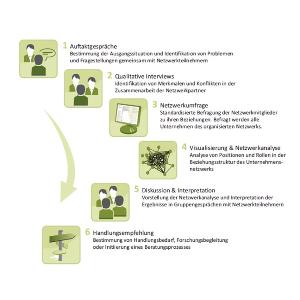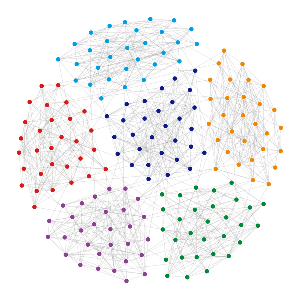What network research can achieve

© KI
Networks promise many advantages. By working together, organizations develop new knowledge, open up new markets, reduce the costs of shared infrastructure, hedge firm-specific uncertainties or collaborate in joint value creation based on new divisions of labour. At the same time, organizational networks face numerous tensions: Competition vs. cooperation, trust vs. control, stability vs. flexibility. In a unique German-wide survey of 170,000 business firms, more than a third stated that they worked in multilateral networks (Glückler et al. 2012). We help companies as well as public and civic organizations to develop effective structures and practices to achieve their goals in collaboration and innovation with the help of network studies.
Prof. Glückler is a co-founder and board member of the German Society for Network Research (DGNet): https://www.netzwerkforschung.org/
How we work: Our SONA method

© Glückler, Panitz & Hammer (2020)
We have developed the Situational Organizational Network Analysis (SONA) method with the aim of developing specific solutions for effective network collaboration together with the network actors (Glückler et al. 2020).
- SONA combines methods of structural analysis of networks with the qualitative analysis of their interactions and relationships.
- SONA is participatory and reflexive: network actors are involved in the analysis and evaluation of cooperation and performance problems.
- SONA promotes network management through customized solutions for the design and coordination of collaboration.
Find out more about the method and its application: SONA in the video
Network studies

© Jakob Hoffmann
We originally used SONA to study organized business networks and included over 300 business firms(Glückler et al. 2012). Based on this experience, we expanded the scope and applied SONA at the micro level of intra-organizational networks as well as at the macro level of organizational fields and entire industries at regional, national and global levels.
The use of SONA helps to increase thevalidity ofthe results, to develop theories of cooperation and innovation and to a ccompany the network development responsibly while adhering to research ethical standards and active participation of the actors.
Find out more about our participation in the development of innovation networks in the textile bioeconomy: BMBF BIOTEXTFUTURE
Studies and Publications
- Glückler J, Panitz R, Hammer I (2020) SONA: A relational methodology to identify structure in networks. Zeitschrift für Wirtschaftsgeographie 64(3), 121–133.
- Glückler J, Hammer I (2012) Situative Organisatorische Netzwerkanalyse. in Glückler J Dehning W Janneck M & Armbrüster T (eds) Unternehmensnetzwerke. Architekturen, Strukturen und Strategien, Heidelberg: Springer Gabler, pp. 73–93.
- Glückler J, Hammer I (2011) Situative Organisatorische Netzwerkanalyse. Zeitschrift Führung und Organisation 80(6), 379–386.
- Panitz R, Glückler J (2020) Network stability in organizational flux: The case of in-house management consulting. Social Networks 61(May), 170–180.
- Glückler J (2014) How controversial innovation succeeds in the periphery? A network perspective of BASF Argentina. Journal of Economic Geography 14(5), 903–927.
- Glückler J, Panitz R (2014) Command or conviction? Informal networks and the diffusion of controversial innovations. in Berthoin-Antal A Meusburger P & Suarsana L (eds) Learning Organizations: Extending the Field, Berlin and Heidelberg: Springer, pp. 49–67.
- Panitz R, Glückler J (2023) Post-Brexit: Do board interlocks make banks take similar relocation decisions? ZFW – Advances in Economic Geography(2–3), 127–141.
- Panitz R, Glückler J (2017) Rewiring global networks in local events: Congresses in the stock photo trade. Global Networks 17(1), 147–168.
- Glückler J, Panitz R (2016) Relational upgrading in global value networks. Journal of Economic Geography 16(6), 1161–1185.
- Glückler J, Panitz R (2016) Unpacking social divisions of labor in markets: Generalized blockmodeling and the network boom in stock photography. Social Networks 47(October), 156–166.
- Hoffmann J, Glückler J (2024) Technology evolution in heterogeneous technological fields: a main path analysis of plastic recycling. Journal of Cleaner Production, 143083.
- Hoffmann J, Glückler J (2023) Technological cohesion and convergence: a main path analysis of the bioeconomy, 1900–2020. Sustainability 15(16), 12100.
- Hoffmann J, Glückler J (2023) Navigating uncertainty in networks of social exchange: a relational event study of a community currency system. Socio-Economic Review 21(4), 2017–2041.
- Glückler J, Hoffmann J (2021) Time banks as transient civic organizations? Exploring the dynamics of decline. in Glückler J Meyer H-D & Suarsana L (eds) Knowledge and Civil Society, Cham: Springer International.
- Glückler J, Suarsana L (2021) The geography of giving and the philanthropic field. in Glückler J Meyer H-D & Suarsana L (eds) Knowledge and Civil Society.
- Glückler J, Hoffmann J (2019) Prácticas económicas alternativas y análisis de redes sociales. in Sánchez Hernández J L (ed) Espacios y Prácticas Económicas Alternativas en las Ciudades Españolas, Cizur Menor, Navarra: Thomson Reuters Aranzadi, pp. 237–249.
- Suarsana L, Glückler J (2016) Vernetztes regionales Engagement: Das Beispiel Heilbronn Franken. Standort 40(1), 25–32.
For further information, please contact

Chair for Economic Geographies of the Future
Economic Geography; Geographies of Knowledge; Networks; Institutions; Governance
